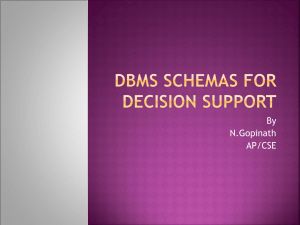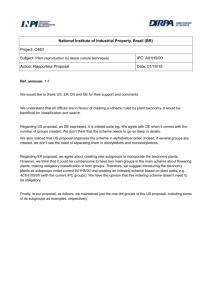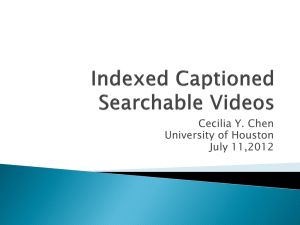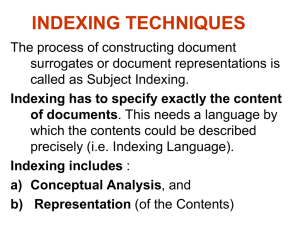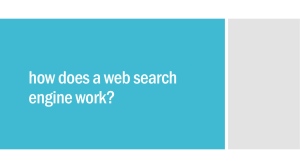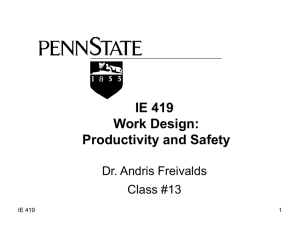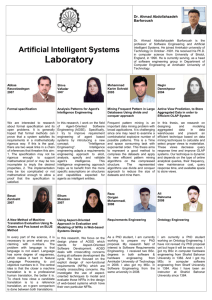621 Applied Physics Key Issues
advertisement
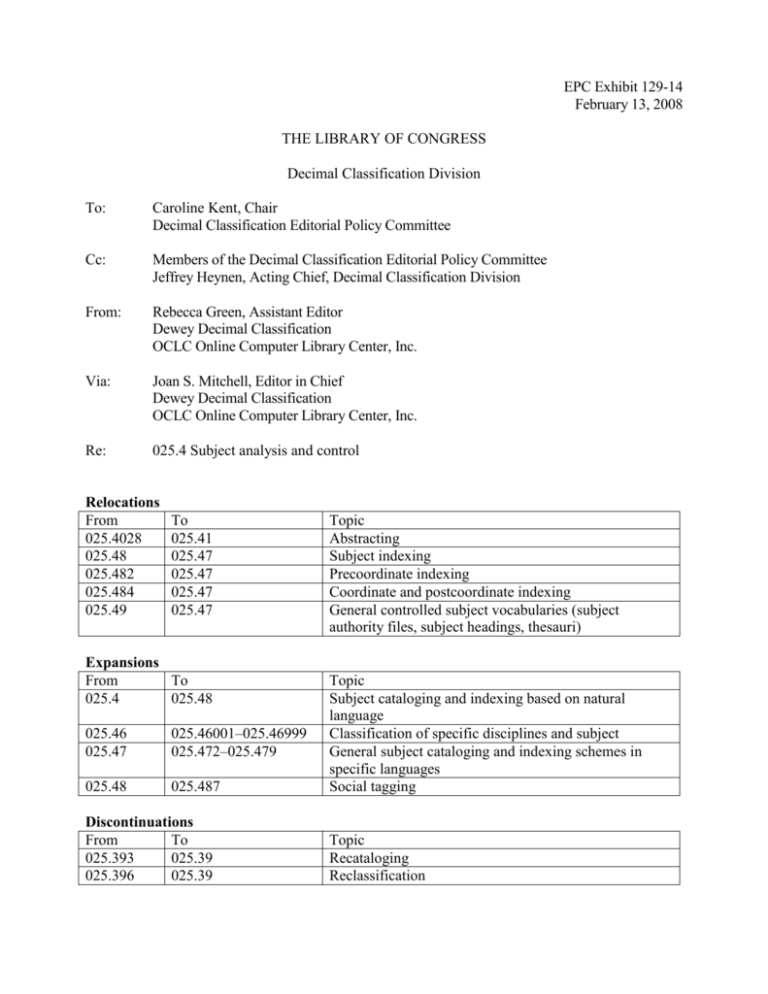
EPC Exhibit 129-14 February 13, 2008 THE LIBRARY OF CONGRESS Decimal Classification Division To: Caroline Kent, Chair Decimal Classification Editorial Policy Committee Cc: Members of the Decimal Classification Editorial Policy Committee Jeffrey Heynen, Acting Chief, Decimal Classification Division From: Rebecca Green, Assistant Editor Dewey Decimal Classification OCLC Online Computer Library Center, Inc. Via: Joan S. Mitchell, Editor in Chief Dewey Decimal Classification OCLC Online Computer Library Center, Inc. Re: 025.4 Subject analysis and control Relocations From 025.4028 025.48 025.482 025.484 025.49 To 025.41 025.47 025.47 025.47 025.47 Expansions From To 025.4 025.48 025.46 025.47 025.46001–025.46999 025.472–025.479 025.48 025.487 Discontinuations From To 025.393 025.39 025.396 025.39 Topic Abstracting Subject indexing Precoordinate indexing Coordinate and postcoordinate indexing General controlled subject vocabularies (subject authority files, subject headings, thesauri) Topic Subject cataloging and indexing based on natural language Classification of specific disciplines and subject General subject cataloging and indexing schemes in specific languages Social tagging Topic Recataloging Reclassification Exhibit EPC 128-13 addressed 010-090 Information & general works. Major changes approved in connection with that exhibit included the following: General catalogs in 017-019 were merged into a single development at 017. 011-017 were modified to apply equally to bibliographies and catalogs throughout. Archival vocabulary was added to relevant entries under 025 to make their intent clearer. Provision was made under 025.04 Information storage and retrieval systems for World Wide Web; Internet and World Wide Web were separated; interdisciplinary works on World Wide Web were relocated from 004.678 Internet to 025.042. This exhibit reexamines several areas of concern from 025.4 Subject analysis and control that were not resolved during Meeting 128: the treatment of abstracting, both on its own and in relationship to its common co-treatment with indexing, subject indexing and its relationship to subject cataloging, provision for specific subject cataloging schemes, in parallel with general classification schemes, and provision for subject cataloging and indexing based on natural language. Two further issues arose in reviewing the current development: the treatment of using classification in searching and navigating information storage and retrieval systems (given the surge in use of faceted classification for this purpose), and lack of literary warrant for recataloging and reclassification. The underlining and strikethroughs in this exhibit reflect only those changes proposed in this exhibit; changes approved previously, but not yet in the production database, are not marked. Abstracting The vast majority (at least 51 of 63) of the WorldCat records classed in 025.4028 Abstracting techniques; auxiliary techniques and procedures; apparatus, equipment, materials are about abstracting; over half (30 of 51) of them also concern indexing. (History note: Until the 19th edition, abstracting was at 029.4, under 029 Documentation. Some amount of the [older] abstracting [and indexing] literature is there.) There are another 101 WorldCat records classed at 025.48 Subject indexing, 28 of which are not about indexing alone, but about indexing and abstracting, subjects that are often written about together. At the same time, the recent literature on abstracting includes an emphasis on automatic abstracting/text summarization. The current situation calls for change for at least three reasons: Abstracting is a core technique of subject analysis and control and is an uneasy neighbor with “auxiliary techniques and procedures.” Comprehensive works on abstracting and indexing should be explicitly provided for, since they are currently scattered. Classifiers should be given direction on how to handle automatic abstracting/text summarization. We recommend taking the following actions: Relocate abstracting techniques from 025.4028 to (a newly expanded) 025.41. The only other numbers available for expansion under 025.4 are 025.44 and 025.45, sandwiched 2 between general classification schemes at 025.43 and discipline/subject-specific classification schemes at 025.46, which are in essence reserved by their neighbors for something classification-oriented. It makes sense to put abstracting first, since it originally served only the role of subject description and thus has affinities with 025.324 Bibliographic description. In the past several decades abstracting has increasingly also served a subject access role, in line with other topics under 025.4. Make 025.41 the comprehensive number for works on abstracting and indexing—not strictly necessary, since it accords with the first-of-two rule, but these works are now scattered, so a clear indication of where they should go would probably be beneficial. Add an entry for computer applications for abstracting at 025.410285, with automatic abstracting and text summarization in a class-here note. (Depending on the outcome of the discussion surrounding computational linguistics initiated in EPC Exhibit 129-21, this number could change.) Subject cataloging We are at a loss to provide a clear and meaningful distinction between 025.47 Subject cataloging and 025.48 Subject indexing. The number 025.47 tends to be used when the LCSH Subject cataloging is assigned as the first subject heading, which tends, in turn, to reflect the topic of the assignment of subject headings. It appears that in the past the intent was to assign 025.47 to represent subject indexing of entire book-length documents, but to assign 025.48 to represent the subject indexing of article-length documents. In concert with a paper by Marcia Bates, entitled “Rethinking Subject Cataloging in the Online Environment” (Library Resources & Technical Services 33 (October 1989): 400-412), this is not a distinction we wish to maintain: A note on terminology: Throughout this article, the terms “indexing” and “subject cataloging” are used interchangeably. Similarly, “thesaurus” is used to refer both to Library of Congress Subject Headings (ordinarily called a subject heading list), as well as to other term lists more conventionally referred to as thesauri. The distinctions between subject cataloging and indexing as processes, and between subject heading lists and thesauri are important more for historical reasons than present practice. Though differences may still be discerned, so many changes in thinking about these are necessitated by the new circumstances associated with the online environment, that traditional distinctions are largely meaningless anyway. We recommend taking the following actions: Merge subject cataloging and subject indexing by relocating comprehensive works on subject indexing from 025.48 to 025.47 and changing the caption of 025.47 to Subject cataloging and indexing (temporarily Subject indexing and cataloging because of the editorial rule calling for relocated topics to come first in headings and notes). Relocate 025.482 Precoordinate indexing to 025.47. There are only 33 WorldCat records assigned this number, most of which are related to various string indexing systems (e.g., PRECIS, NEPHIS, POPSI). Additional assignment to this class would be unlikely. Relocate 025.484 Coordinate and postcoordinate indexing to 025.47. Only 3 records have been assigned this number. 3 Subject cataloging schemes In response to a request from EPC member Welna van Eeden, we recommend providing for general subject cataloging schemes as follows: Expand at 025.47 Subject cataloging for specific general subject cataloging and indexing schemes, conceptually in parallel with the development for general classification schemes at 025.43. Since such schemes (e.g., LCSH, RVM [Répertoire de vedettes-matière], SWD [Schlagwortnormdatei], Soggetario per i cataloghi delle biblioteche italiane) are usually language-specific, the development is best handled through the addition of Table 6 notation. At present there does not appear to be significant literary warrant for subject cataloging schemes other than LCSH in WorldCat, but they are likely to exist in other catalogs and/or to come into WorldCat through batch load. Provide for bilingual/multilingual schemes by giving an instruction to add notation for the language coming last. Subject cataloging and indexing based on natural language At present, 025.486 Title manipulation is the only class for subject indexing that is not based on a controlled vocabulary. Clearly many subject searches are conducted that neither use controlled vocabulary nor rely on title manipulation. We recommend providing for such subject access by taking the following actions: Recast 025.48 as Subject cataloging and indexing based on natural language. Change the caption at 025.486 from Title manipulation to Keyword indexing. Delete catchword indexing from the including note at 025.486 (a WorldCat search on kw: catchword and dd:025.486* retrieves no records). Develop a class for social tagging at 025.487. Literary warrant in WorldCat has not yet reached the 20-record threshold, but this threshold will probably be reached and exceeded within the next year or two. Peripheral actions The past few years have seen a steadily increasing use of facets, traditionally an aspect of classification and indexing, in navigating/browsing/searching information storage and retrieval systems. A class-elsewhere note from 025.42, where faceted classification is classed, will direct the classifier to 025.04 (where the class-here note, “Class here search and retrieval in information storage and retrieval systems . . .” already covers the situation on the in-bound side). At present the scheme has separate subdivisions for recataloging and reclassification, for which there is little literary warrant (there are only 3 WorldCat records at 025.393 and 025.396 combined and only 10 records in 025.39*). These classes are best discontinued to their superordinate class. Minor changes in spelling, word order, etc., have been made for the sake of consistency. We will add a Relative Index term for descriptive metadata to 025.3. 4 Proposed schedule 025.39 *Recataloging, reclassification, re-indexing reindexing Standard subdivisions are added for any or all topics in heading Class recataloging, reclassification, re-indexing reindexing of special materials in 025.34 025[.393] Recataloging Including descriptive and subject Number discontinued; class in 025.39 See also 025.396 for reclassification 025[.396] Reclassification Number discontinued; class in 025.39 025.4 Subject analysis and control Class here standards for subject analysis and control ... 025.402 8 Abstracting techniques; Auxiliary techniques and procedures; apparatus, equipment, materials Class composition of abstracts in 808.062 Abstracting relocated to 025.41 025.41 *Abstracting [formerly 025.4028] Class here comprehensive works on abstracting and subject indexing Class composition of abstracts in 808.062 For subject indexing, see 025.47 025.410 285 Computer applications Class here automatic abstracting, automatic text summarization 5 025.42 *Classification and shelflisting Standard subdivisions are added for classification and shelflisting together, for classification alone Class use of classification for search and navigation in information storage and retrieval systems in 025.04; class classification of special materials in 025.34; class cooperative classification in 025.35; class reclassification in 025.396 For general classification systems, see 025.43; for classification of specific disciplines and subjects, see 025.46 ... 025.43 *General classification systems Class parts of general classification schemes applied to a specific subject or discipline or subject with the subject or discipline or subject in 025.46, e.g., Library of Congress Class L Education 025.4637 ... 025.46 Classification of specific disciplines and subjects Add to base number 025.46 notation 001—999, e.g., classification of education 025.4637 025[.460 001-.460 009] Standard subdivisions Do not use; class in 025.4201–025.4209 025.460 01-.469 99 *Specific disciplines and subjects Add to base number 025.46 notation 001–999, e.g., classification of education 025.4637 6 025.47 *Subject indexing [formerly 025.48] and cataloging Standard subdivisions are added for either or both topics in heading Class here comprehensive works on subject indexing [formerly 025.48]; precoordinate indexing [formerly 025.482], coordinate and postcoordinate indexing [both formerly 025.484]; general controlled subject vocabularies (subject authority files, subject headings, thesauri) [all formerly 025.49]; comprehensive works on subject indexing and cataloging using natural language and controlled vocabulary Class subject cataloging and indexing of special materials in 025.34; class cooperative subject cataloging and indexing in 025.35; class recataloging and reindexing in 025.393. Class parts of general controlled subject vocabularies (subject authority files, subject headings, thesauri) applied to a specific discipline or subject with the discipline or subject in 025.49, e.g., Library of Congress Subject Headings for law 025.4934 For classification, see 025.42; for subject cataloging and indexing based on natural language, see 025.48; for subject cataloging and indexing of specific disciplines and subjects controlled subject vocabularies, see 025.49 025.472–.479 *General subject cataloging and indexing schemes in specific languages Add to base number 025.47 notation —2–9 from Table 6, e.g., list of Italian subject headings 025.4751 A bilingual or multilingual scheme is classed with the language coming last in Table 6, e.g., a general thesaurus in English, French, Spanish, Russian, Arabic, and Chinese 025.47951 025.48 *Subject cataloging and indexing based on natural language Including citation indexing Comprehensive works on subject indexing relocated to 025.47 Class indexing of special materials in 025.34; class cooperative indexing in 025.35; class re-indexing in 025.39 comprehensive works on natural language and controlled vocabulary subject indexing and cataloging in 025.47 For controlled subject vocabularies subject cataloging and indexing of specific disciplines and subjects, see 025.49 7 025[.482] *Precoordinate indexing Including chain indexing, relative indexing Relocated to 025.47 See also 025.42 for precoordinate classification; also 025.47 for precoordinate subject cataloging 025[.484] *Coordinate and postcoordinate indexing Standard subdivisions are added for either or both topics in heading Relocated to 025.47 025.486 * Title manipulation Keyword indexing Including catchword, KWIC (Key Word in Context, KWOC (Key Word Out of Context) indexing 025.487 *Social tagging Variant names: collaborative tagging, collaborative indexing, folksonomy, social classification, social indexing 025.49 Subject cataloging and indexing of specific disciplines and subjects Controlled subject vocabularies Class here subject authority files, subject headings, thesauri General controlled subject vocabularies (subject authority files, subject headings, thesauri) relocated to 025.47 Class general subject cataloging and indexing using controlled vocabulary in 025.47; class general subject cataloging and indexing based on natural language in 025.48 025[.490 001-490 009] *Standard subdivisions Do not use; class in 025.4701–025.4709 025.490 01-.499 99 Vocabularies of specific Specific disciplines and subjects Add to base number 025.49 notation 001–999, e.g., subject headings in science 025.495 *Do not use notation 0218 from Table 1; class in base number 8
